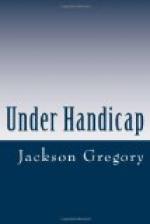The first day had been purgatory. The second was hell. His raw, blistered fingers shrank from his hammer-handle, from the sun-heated iron bar. The muscles which through long idleness had grown soft, and which had been taxed all day yesterday, cried out with sharp pains as to-day they were called upon. He had thought that the night would have rested him; instead it had but made his arms and hands and back stiff and unfit. When ten o’clock came he felt as tired as he had been last night at quitting-time. The heat was more intense, the day sultry, with a thin film of clouds across the gray sky allowing the sun’s rays to scorch the earth, refusing to let the sand radiate the heat which clung to it like a bank of heavy steam. Their water-bottle, although they kept it always in the shade of some scorched tree or bush, grew as warm as the air about it. Still Conniston drank great quantities of the warm water until even it warred against him and made him sick. All morning long he fought against a dull, throbbing headache. At noontime he ate little, but sat still, with his bursting temples between his hands.
Again the afternoon dragged on, unbearably long, each tortuous second a slow period of agony. Lonesome Pete’s stories of the range country he heard, while he did not attempt to grasp their significance. They no longer amused him. His own position, his own condition, no longer amused him. He felt that he could not laugh; he knew that he would not. He told himself over and over that he was a fool for attempting drudgery like this. He vowed that when at last the day’s work was done he would go to Mr. Crawford and say, “I have worked off what I owe you. I am going to quit.” They could think what they chose. They could laugh if it pleased them. His was a finer nature than theirs; he was a gentleman, thank God, and no day-laborer.
And night came, and he ate what he could and dragged himself into his bunk in silence. He saw the glances which were directed toward him when he came into the bunk-house; he knew what the men were thinking. He knew what they would say. And while it had been pride until now, now it was nothing in the world but lack of moral courage which made him stick to the thing which he hated.
This day again he had seen Roger Hapgood’s horse in the stable. He had heard one of the men say that Hapgood was still resting up at the house as a guest. He himself had not had a fleeting glimpse of Argyl Crawford, and he knew that Hapgood was seeing her constantly. A quick bitterness made up of resentment and a kind of jealousy sprang up within him. He knew that at least the girl was blameless, and yet he blamed her. He told himself, knowing that he was wrong, that she was unfair, unjust, even unkind.
The third day came. It was longer, drearier, wearier than the other two had been. He began to fear that soon he should have to give up. His body, instead of becoming gradually inured to the long hours of toil, seemed to be gradually succumbing to them. He felt that he was wearing out, breaking down. He did not know if Hapgood were still on the Half Moon or if he had gone. He did not greatly care.




